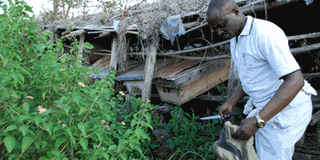Mini farming : Kamwenge farmer makes a family tradition lucrative

Tunanukye shares tips with other bee farmers.PHOTO BY MICHAEL KAKUMIRIZI
My name is George Tunanukye. I live in Kamwenge Town, Kamwenge District. I grew up seeing my father and grandfather keep bees to produce honey for home consumption and medicinal purposes.
The start
In 1983, due to lack of school fees, I dropped out of school. From then, life became quite challenging. In 1986, my father gave me Shs200,000. I used this money to start up business dealing in agricultural produce. I was 19 years old then.
I used the proceeds from the business to purchase six acres of land at Shs1.3m where I developed different agricultural enterprises on a small scale. Part of the land was reserved for keeping bees in order to have honey for home consumption. I started with eight bee hives, which I made from locally available materials.
Over a period of five years, I kept increasing the number up to 17. The yield was 8kgs per season, which made me think of selling some of it because the quantity became too much for just home consumption. I would sell each kilogramme at Shs3,000.
Beekeeping has two peak seasons in a year; February–April and August-October.
Despite the little income I got from selling surplus honey, I realised that bee keeping could be a profitable business. It is against this background that I teamed up with other farmers to acquire better skills of beekeeping from Kabarole Private Sector Consultancy Training Centre in 1999.
By 2001, I was harvesting 12 kgs of honey after introducing another type of bee hive, Kenyan Top Bar (KTB), on my farm. It enables the bees produce more honey compared to the local hives I had.
Subsequently, I increased the bee hives to 100 as I added another type called Longstroth. This boosted the production up to 78kgs per season thus earning me Shs234,000 at each harvest.
The yield later rose to 138kgs per season after establishing several water points around my farm and also improving on harvesting management.
Since beekeeping is not labour intensive, I do most of the work myself except during the harvesting where I contract three people to help me.
Challenges
Lack of adequate water points makes it difficult to make good site selection for the bee hives. Water helps in keeping warmth in the bee hives to enhance honey production.
The foliage, which helps the bees in making honey, also remains another challenge due to increased bee population in the area. To make a kilogramme of honey, a bee has to visit five million flowers. Because there are many hives and the population is big, they compete in the same area for foliage, which lowers the harvest.
Lack of honey extraction equipment is another challenge because it makes me incur other costs since the one available (for the cooperative society) is based in Kamwenge Town, where every farmer has to go for honey extraction after harvest.
Achievements
In spite of the challenges, we have formed a savings and cooperative society which buys honey at Shs5,000 a kilo, which is a better price. The cooperative processes it into better products and searches for market. I now earn more than Shs1.3m from honey a year.
With the money from honey, I have invested in poultry, forestry and piggery. I have built myself a house, expanded the land to 10 acres, and been able to pay for my children’s education. I do not regret continuing the family tradition of beekeeping and taking it to another level.
Future plans
I intend to expand to 200 hives, and buy extraction and processing equipment to add value to the honey. I also hope to impart these skills to other upcoming farmers.




